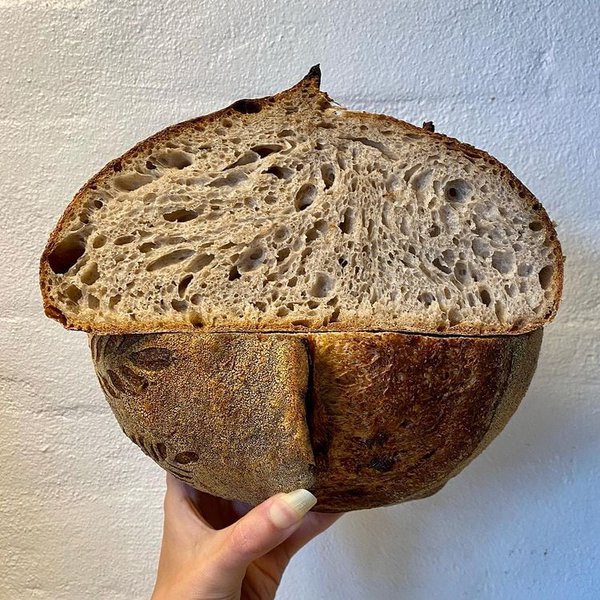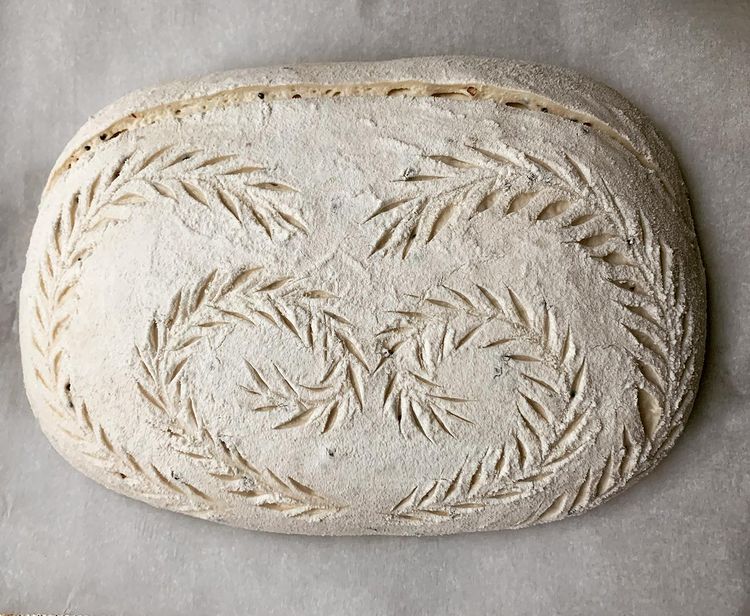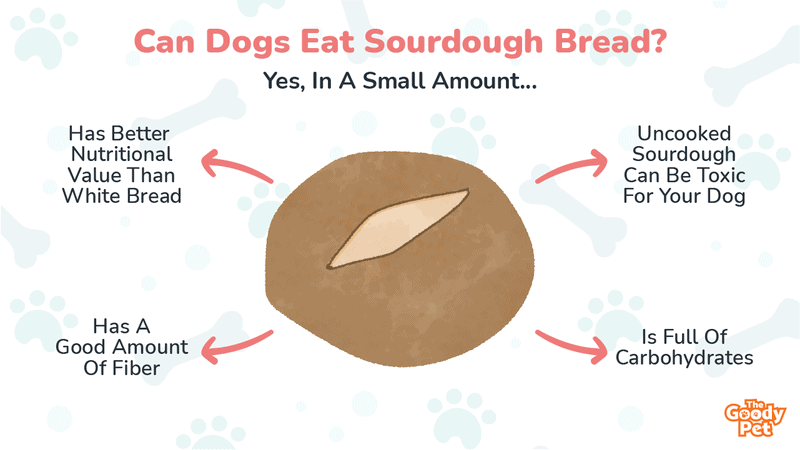Who doesn’t want that freshly toasted sourdough that crunches in your mouth when you take a good bite out of it? Even fido can get envious just hearing that crackle.
Sourdough bread has become popular in recent years and a lot of home cooks have even tried making one at home. But is it alright to share your sourdough bread with fido?
Yes, your dog can have a bite of sourdough bread but only in small amounts. Sourdough is not something that you can add to its diet on a regular basis. Since it consists mostly of carbohydrates, sourdough bread, or all bread for that matter, are not a good source of nutrients that your pet dog needs for a complete and balanced diet.
Sourdough bread is made from flour, water, salt, and a starter or live yeast that has naturally occurring Lactobacillaceae that produces lactic acid, giving it that distinctive sour taste.
If you love sourdough and have the habit of feeding it to your dog, this article will discuss if it is safe to give sourdough to your pet dog, as well as, the health problems you might encounter if you give too much of the bread.
Is Sourdough Bread Toxic To Dogs?

No, sourdough bread is not toxic to dogs as long as they are given in moderation and they do not suffer from any wheat allergies. Sourdough bread, however, can add unwanted calories to their diet without any valuable nutrition since it is mostly carbohydrates.
One thing to look out for is uncooked sourdough bread or raw dough for this is highly toxic to dogs. That said, at all cost, do not give dogs unbaked sourdough bread.
How much sourdough is safe for dogs to consume in a day? What about regular bread, is it better? Let’s get into the details now…
Sourdough Bread VS Regular Bread
To better learn about sourdough bread, let us first examine what makes it different from other commercially-available bread.
Regular bread is usually fermented using dry and packaged yeast while sourdough bread uses live bacteria or a starter culture made by fermenting flour and water for several days. This produces the bacteria lactobacilli which are responsible for making the dough rise during the baking process.
The lactic acid produced from this fermentation is shown in some studies to help lessen allergic responses and inflammation.
Nutritionally, sourdough is better than regular white bread because of its lower glycemic index, thereby preventing sudden spikes in glucose levels in the blood.
Sourdough bread also has prebiotic and probiotic properties that help improve gut health, digestion, and vitamin absorption. Sourdough made from whole grains has more fiber and gut-friendly benefits.
Is It Safe To Feed Your Dog Sourdough Bread Every Day?
Given that sourdough bread is more nutritious than other bread, or any bread for that matter, sourdough bread should only be given as a treat occasionally. They are considered filler foods and provide little nutrition for your pet’s health.
Bread is also full of carbohydrates and calories that can cause obesity if given regularly. Your dog needs more protein in its diet than carbohydrates and breads only add calories that are not necessary.
Ideally, bread should not exceed 5% of your dog’s daily meals. If you still wish to give bread to your dog, then sourdough made from whole wheat is a good alternative.
Is Unbaked Sourdough Bread Bad For Your Dog?

Yes, as mentioned earlier, unbaked sourdough is toxic to your dog. When you bake your bread at home, part of the procedure is letting the bread dough rise.
Raw dough, which is undergoing fermentation, produces gasses like ethanol and carbon dioxide that can cause bloating and alcohol toxicosis in dogs.
These gases evaporate when baked and are responsible for that air pocket appearance we see in bread.
If your dog accidentally ingested this raw dough, the fermentation will continue inside its stomach that will cause it to swell or bloat.
Dangers Of Bloating
Bloating occurs when the digestive tract gets filled with gas. This condition is also called gastric dilatation and volvulus (GDV) and is a serious and painful condition that needs immediate veterinary attention.
When the stomach gets filled with gas or carbon dioxide, it twists upon itself blocking the entrance and exit of the stomach. It could also increase the pressure on the diaphragm, the spleen, and can impede blood flow to the heart.
The signs of bloating include:
- Foamy saliva
- Excessive drooling
- Rapid and shallow breathing
- Retching
- Enlargement and pain in the abdomen
- Pale gums
- Retching or inability to vomit
- Vomiting
- Treatment For Bloating
The veterinarian would perform the following procedures to lessen the pain and confirm that a dog may be suffering from bloating:
- X-rays to scan if there is stomach twisting.
- Pain relief would be given to make the dog comfortable.
- A fluid drip may be administered if the blood pressure gets too low.
- Surgery may be performed to untwist the stomach. The spleen would also be checked since it is adjacent to the stomach. In some cases, the spleen is removed if there is too much damage.
Alcohol Toxicosis
The ethanol produced during fermentation also wreaks havoc on your dog’s health and can enter its bloodstream. It can cause their blood sugar to drop, lower their blood pressure, and hypothermia.
Your dog’s size, age, and weight, as well as, the amount of raw dough it ingested will determine the severity of alcohol poisoning. The signs of alcohol toxicosis include:
- Ataxia or loss of bodily movements
- Disorientation
- Tremors
- Dehydration
- Breathing difficulty
- Unsteady gait
- Vomiting
- Diarrhea
- Seizures
- Coma
The treatment for alcohol toxicosis includes the inducement of vomiting or the washing out of cold water to the stomach. This would break down the dough material and decrease further ethanol production.
The dog would also be administered intravenous fluids to improve the elimination of ethanol and normalize the electrolytes.
In extreme cases, the drug yohimbine is given if the dog suffers from severe breathing problems and is comatose.
Prevention And Safety Tips In Giving Sourdough Bread To Your Dog
There are some things you can do to prevent fido from accidentally eating sourdough bread or other toxic foods, for that matter:
- When you are baking your own sourdough bread, make sure to keep it out of reach from fido. Sometimes fido can be a little sneaky when we are not aware of it and that bowl of rising dough might be on his line of target.
- Know if your dog is allergic to bread products. If you are constantly feeding your dog bread and you see some signs of hair loss, itchiness, dry skin, and stomach upsets, then your dog might be allergic to gluten.
- During holidays or when having parties at home, make sure to remind your guests not to give your dog any human food. They might not be aware of the dangers of some food that could be toxic to your pet dog.
- If fido has the habit of begging for food while you are eating, keep some dog kibble beside you so you can give him that instead.






